Straw Dogs Blu-ray Movie
HomeStraw Dogs Blu-ray Movie 
Unrated VersionMetro-Goldwyn-Mayer | 1971 | 118 min | Unrated | Sep 06, 2011
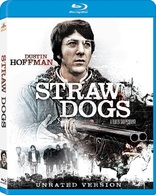
Movie rating
7.7 | / 10 |
Blu-ray rating
| Users | 4.2 | |
| Reviewer | 4.0 | |
| Overall | 4.0 |
Overview
Straw Dogs (1971)
To avoid the Vietnam-era social chaos in the U.S., American mathematician David Sumner moves with his British wife, Amy, to the isolated Cornish town where she grew up, but their presence provokes antagonism among the village's men.
Starring: Dustin Hoffman, Susan George, Peter Vaughan, T.P. McKenna, Del HenneyDirector: Sam Peckinpah
| Drama | 100% |
| Psychological thriller | 33% |
| Thriller | Insignificant |
| Crime | Insignificant |
Specifications
Video
Video codec: MPEG-4 AVC
Video resolution: 1080p
Aspect ratio: 1.85:1
Original aspect ratio: 1.85:1
Audio
English: DTS-HD Master Audio 5.1 (48kHz, 24-bit)
Subtitles
English SDH, French, Spanish
Discs
50GB Blu-ray Disc
Single disc (1 BD)
Playback
Region free
Review
Rating summary
| Movie | 4.5 | |
| Video | 4.0 | |
| Audio | 4.0 | |
| Extras | 0.5 | |
| Overall | 4.0 |
Straw Dogs Blu-ray Movie Review
Home Is Where the Harm Is
Reviewed by Casey Broadwater September 6, 2011“A man’s home is his castle.” As a saying, it’s tidy and seemingly innocuous enough, but in the disturbing and still-controversial Straw Dogs, outlaw filmmaker Sam Peckinpah rips open the axiom to examine its underlying assumptions about manhood, possession, and machismo. Made shortly after his nihilistic revisionist western The Wild Bunch—which established Peckinpah’s international reputation as a provocateur—Straw Dogs came to U.S. theaters in December of 1971, just two weeks after the premiere of Stanley Kubrick’s A Clockwork Orange. Beyond the fact that both were made in England by American-born directors who never quite fit the Hollywood mold, the two films were immediately compared for their shared use of brutal on-screen ultra-violence and their unflinching depictions of rape. But while Kubrick used violence primarily as an intellectual agent—his is the more philosophical film, positing the power of individual free will over state-sponsored mind control—Peckinpah goes straight for his audiences’ guts. To this day, Straw Dogs remains a visceral experience that lays man’s animal instincts bare.
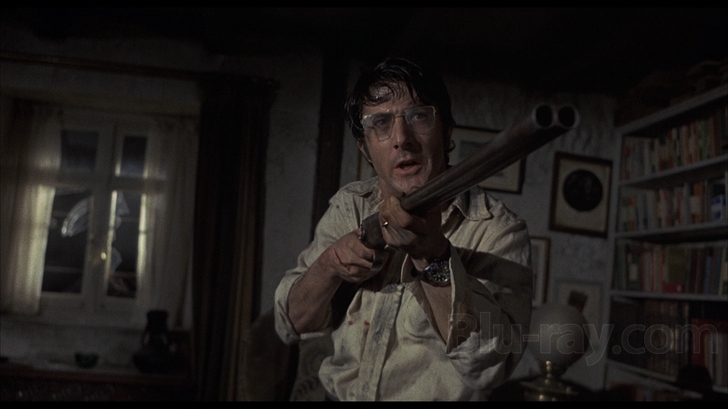
The last act of Straw Dogs is a sustained home invasion sequence that puts the movie in the company of other “siege” films like Rio Bravo, Night of the Living Dead, and Assault on Precinct 13, where unlucky characters are forced into barricading themselves against the onslaughts of an unremitting enemy. Although this defend-the-castle conclusion is thrillingly executed and—indeed—is what the film is best remembered for, it tends to overshadow the subtleties and brilliance of everything that comes before it. Peckinpah starts with a classic fish-out- of-water scenario. In this case, the fish is David Sumner (Dustin Hoffman), an effete American “astro-mathematician” who—in order to finish writing his book in peace—has moved to the rural village of Wakely, England, the hometown of his young wife, Amy (Susan George). The move is more of a retreat than anything, and in the militaristic sense. It’s hinted that David—cowardly and diffident—left the U.S. to avoid having to take a stand in the ongoing civil rights and anti-war protests.
Confrontation follows him to the bucolic English countryside, though, for two main reasons: 1.) He’s a geeky, nebbish foreigner who stands out amongst the town’s hard-ass populace of grimy and clannish day laborers, and 2.) his sex-bomb of a wife—who goes bra-less and flaunts it—was the one-time girlfriend of the toughest local brute of them all, a thick-faced Cro-Magnon named Charlie (Del Henney) who’s determined to get back into Amy’s pants. David hires Charlie and his gang of like-minded droogs—if I can borrow a term from A Clockwork Orange—to fix up the isolated farmhouse he and Amy have bought, but this, of course, is a bad idea. The men have no respect for the bespectacled American—they find sly ways to humiliate him without losing their jobs—and their antagonism gradually escalates to outright intimidation. A turning point comes when David opens the bedroom closet to find Amy’s cat hanging lifelessly from the light pull.
It’s a grim, literally in-your-face portent of things to come, but the shock gives way to a nuanced change in David and Amy’s relationship. Their marriage before the cat incident wasn’t exactly perfect, but the cracks certainly become more evident afterward. For one, there’s a growing disparity in their ideas of appropriate gender roles. David wants Amy to be the traditional wife, a position she’s symbolically rejected by siding with the second wave feminists of the era and going without a bra. At the same time, he avoids being a traditional husband, as evidenced by his inability—masked as unwillingness—to not only fix up the house, but also to protect his wife and stand up for himself. Instead of confronting his aggressors, he cows to them and even tries to befriend them, a tactic that has disastrous consequences. This is one of Dustin Hoffman’s best roles; he conveys humiliation and emasculation wonderfully, but most impressive is the way his character seems to hide these emotions, even from himself.
The statute of limitations is up, but I’ll throw down a spoiler alert here anyway, as it’s impossible to talk about Straw Dogs without mentioning what comes next. (Skip ahead to the next paragraph if you haven’t seen the film and you’re sensitive about spoilers. Personally, I’ve never had a movie “spoiled” for me by foreknowledge of a particular plot turn. If a film is well-made it’s going to work no matter what you do or don’t know about it.) David’s cowardice inadvertently leads to his wife’s rape, a scene that was and perhaps still is controversial, precisely because mid-way through the assault it appears that Amy is beginning to enjoy it. Peckinpah detractors are quick to bring up this scene as an example of the director’s misogyny-by-way-of-exploitive-male-sexual-fantasy, but I think the sequence is more complicated than that. The horror and inherent wrongness of the rape is made clear, and even Amy’s apparent acquiescence seems more like a case of confused sense memory—Charlie is, after all, a man with whom she’s had sex before—than an expression of genuine pleasure. The overwhelming feeling—for Amy and us, the audience —is a complicated amalgam of fear, titillation, and revulsion, and Peckinpah’s rapid-fire editing here is forceful, jumping between shots of the violent encounter, conflicting images in Amy’s mind of David getting undressed, and almost comical flashes to David impotently trying to shoot ducks out on the moor. Later, when David and Amy are out at a church social, the way Peckinpah edits her flashbacks to the rape turn the otherwise banal potluck into a grotesque exercise in psychological terror.
But there is terror yet to come. Through a series of complications, David and Amy end up harboring the village idiot, repressed pedophile Henry Niles (David Warner), a simpleton who, like a lurching English version of Lenny from Of Mice and Men, has accidentally killed the sexpot daughter of the town drunk, Tom (Peter Vaughan), a bearded lunatic who will stop at nothing to defend his family honor. (From his reaction, honor and revenge seem more important to Tom than his daughter ever was.) Tom, Charlie, and the rest of the local rabble-rousers surround the farm, intent on getting inside, and David is shocked out of his masculine complacency of abstract mathematics and into concrete action, setting up booby traps— that bear clamp over the fireplace will definitely come in handy—and thinking fast on his feet. Yes, Straw Dogs is about a man who becomes a man, but Peckinpah’s view of manhood has no room for a domestic, happy-ever-after ending. According to “Bloody Sam,” our hero— beneath his nerdy glasses and knitted sweater—is just as capable of carnage as the men he finally stands up against. A man’s home may be his castle, but he’d be more at home out in the wild with the other predators.
Do note the version contained here is the unrated, 118-minute uncut edition of the film.
Straw Dogs Blu-ray Movie, Video Quality 
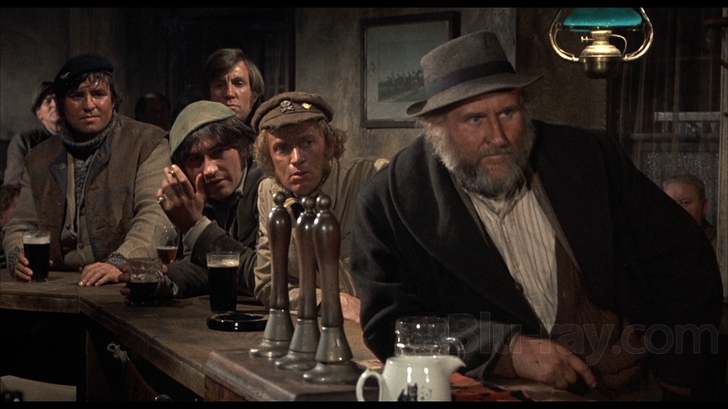
Straw Dogs receives a solid upgrade on Blu-ray, with a 1080p/AVC-encoded transfer faithfully framed in the film's original 1.85:1 aspect ratio. Most other aspects of the transfer seem faithful as well. DNR hasn't been used to slather the film's textures to oblivion—grain remains rich, if noticeably heavy at times—and there are no halo-ish leftovers from injudiciously applied edge enhancement. The print used probably could've been cleaned up a bit better—there are semi-frequent but small white specks that would've been easy to remove with enough time and effort—but there are no major scratches, stains, or warpage. Clarity is much as you'd expect, not quite as sharp as most contemporary films, but more than suitably resolved in high definition, with fine detail visible in close-ups and no instances of pervasive softness. While the scene where David goes duck hunting looks a little rough —extremely grainy and softer than the rest of the film—I don't suspect much could've been done about this. Peckinpah captures the moodiness of the moors here, and the Blu-ray handles the color cinematography well, with dense neutrals and balanced skin tones. Black levels are plenty deep and even in the darkest scenes—the home invasions sequence—you can still make out shadow detail where it's intended. Compression artifacts are limited to some light noise and splotchiness in certain flat colors. I have no doubt the film could look slightly better—in the hands of the Criterion Collection, say—but fans should be pleased with this presentation of Straw Dogs.
Straw Dogs Blu-ray Movie, Audio Quality 
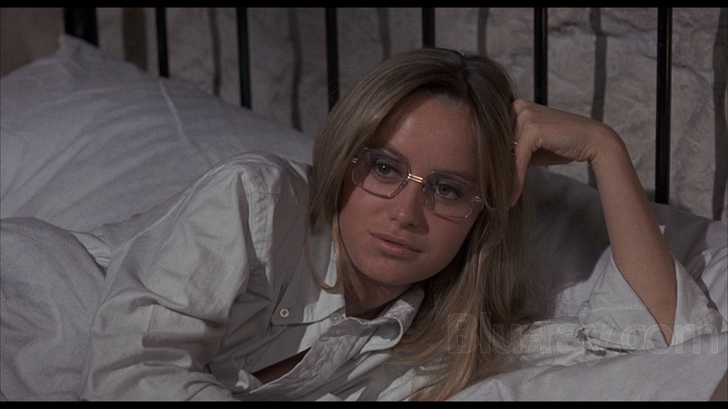
Straw Dogs original mono soundtrack has been expanded into a lossless DTS-HD Master Audio 5.1 surround track, but fret not, purists; the mix features no shoed-in new sound effects or unnecessary alterations. The rear channels now mostly serve as bleeding room for Jerry Fielding's score, which sounds wonderful here, albeit a bit on the thin side, as you'd expect from a film now forty years old. The surround speakers also play host to some quiet ambience and occasional effects, but nothing particularly noteworthy or standout-ish; you really have to pay attention to notice any of it. And this, I think, is a good course of action. Rather than taking the gimmicky route—re-engineering the track so that all gunshots ping through the rears, for example—MGM has simply given the original audio a slightly wider berth. Most importantly, dialogue is always clean and easy to understand and there are no distracting hisses, crackles, or drop-outs. The disc includes optional English SDH, Spanish, and French subtitles.
Straw Dogs Blu-ray Movie, Special Features and Extras 
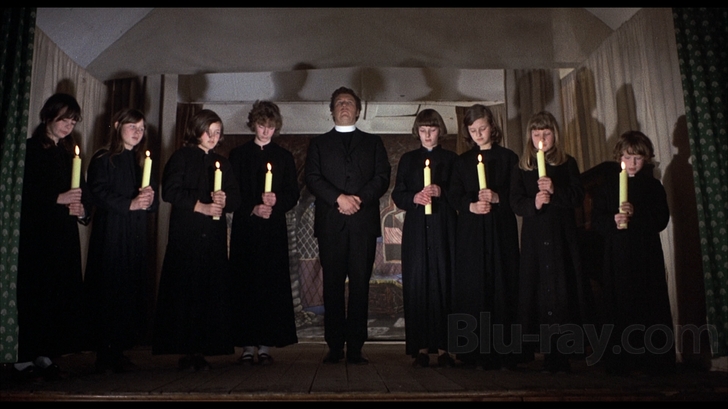
Unfortunately, MGM's Blu-ray release of Straw Dogs inherits none of the supplements from Criterion's 2-disc DVD set, which included a commentary track, a documentary on Peckinpah, interviews, behind-the-scenes footage, and more. The only features here are three short TV spots and a theatrical trailer, all in standard definition.
Straw Dogs Blu-ray Movie, Overall Score and Recommendation 
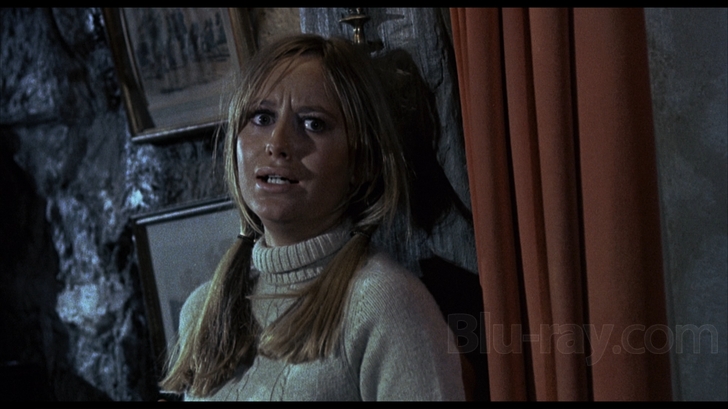
After making several westerns, Straw Dogs was Sam Peckinpah's first foray into other genres, and I think it stands as one of his best films— terrifying, violent as hell, and still controversial forty years later. On the one hand, I'm glad to finally have the film in high definition—and the Blu-ray looks great—but I am slightly disappointed that MGM wasn't able to license any of the special features from Criterion's 2-disc DVD set, let alone create any new supplements. So, don't throw away that old copy of Straw Dogs just yet, but if you don't yet own the film it's hard to pass it up in 1080p. Yes, there's a remake coming out on the 16th—this time the film is set in the upper-case Deep South—but I can't imagine it'll even come close to touching the incendiary power of the original. Highly recommended!
Similar titles
Similar titles you might also like

Wake in Fright
1971

Taxi Driver
1976

Get Carter
1971

You Were Never Really Here
2017

Cape Fear
1991

The Conversation
1974

A Clockwork Orange 4K
1971

Tom at the Farm
Tom à la ferme / English packaging / Version française
2013

Night Moves
2013

Insomnia
1997

M
M - Eine Stadt sucht einen Mörder
1931

The Offence
1973

The Friends of Eddie Coyle
1973

We Need to Talk About Kevin
2011

Martha Marcy May Marlene
2011

Nocturnal Animals
2016

Black Narcissus
1947

Cymbeline
2014

Child of God
2013

The Long Goodbye
4K Restoration
1973
